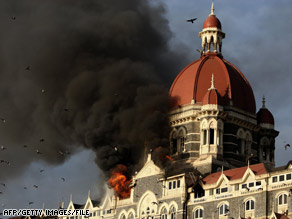
Flames and smoke gush from the Taj Mahal hotel in Mumbai, India, on November 27.
Brown's shuttle diplomacy -- aimed at easing tensions between India and Pakistan in the wake of last month's Mumbai terror attacks -- comes as Pakistan's military said Indian fighter jets encroached on its airspace.
Before leaving India, Brown told reporters he had no doubts there was a connection between the Mumbai attacks and Lashkar-e-Tayyiba (LeT), a Pakistani-based terror group.
"We also know there have been arrests in Pakistan," Brown said. "We also know that the group responsible is LeT."
Relations between India and Pakistan -- both neighbors with nuclear arms -- deteriorated amid evidence that the militants who targeted 10 sites in Mumbai last month were trained in Pakistan.
More than 160 people were killed in the three-day siege that began November 26 and targeted two luxury hotels, a popular train station and other landmarks. Of the 10 suspects in the attacks, only 21-year-old Mohammad Ajmal Kasab survived, according to police.
Reports have emerged that Mohammad Ajmal Kasab has confessed to his role in the assault on the city.
Meanwhile, despite the reported violation of Pakistani airspace by Indian jets, Pakistani Prime Minister Syed Yousuf Raza Gilani said his government was not concerned that India's Air Force might attack suspected terror camp sites in Pakistan.
Pakistan Information Ministry spokeswoman Sherry Rehman said the Indian government "explained to us that these violations were inadvertent."
Don't Miss
Indian Air Force spokesman, Wing Commander Mahesh Upasani, denied there was an airspace violation in an interview with CNN sister network, CNN-IBN. He said the report was part of a campaign designed to divert attention from the main issues.
"These allegations are utterly untrue and I would call them rather preposterous," Upasani said.
Rakesh Maria, Mumbai's joint police commissioner of crime, told a news conference on Saturday that the surviving attacker, Mohammad Ajmal Kasab, has confessed to his part in the attacks, according to CNN-IBN.
The confession was made in a three-page letter written in Urdu, which will be delivered to the Pakistan High Commission, or embassy, in New Delhi, India, possibly on Monday, the network reported.
He has asked for legal aid in the letter, a Mumbai police official said.
Maria paraphrased parts of the letter at a news conference but did not release a copy to the media, CNN-IBN said.
Investigators said Kasab is from Faridkot village in the Okara district of Pakistan's Punjab province and that the other nine alleged attackers also were from Pakistan.
Pakistani officials have denied that assertion, instead blaming "stateless actors."
Last week, Pakistani authorities banned a charity linked to the attacks and placed its leader under house arrest, Pakistan's information minister told CNN. The move came after the U.N. Security Council designated the charity, Jamaat-ud-Dawa (JuD), a terror organization because of its links to Lashkar-e-Tayyiba (LeT) and placed sanctions on the group.

India has blamed LeT for training the attackers who carried out the Mumbai attacks.
Pakistani officials have said they are cooperating with the Mumbai investigation and are committed to fighting terrorism.








No comments:
Post a Comment